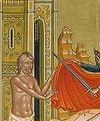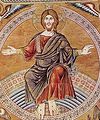

| Previous day | Next day |
| Old Style
February 22
|
Sunday |
New Style
March 6
|
|
Meat-fare Sunday.
Tone 7.
Заговенье на мясо. |
Fast-free period.
|
![]() Uncovering of the relics of the Holy Martyrs at the gate of Eugenius at Constantinople (395-423).
Uncovering of the relics of the Holy Martyrs at the gate of Eugenius at Constantinople (395-423).
Martyrs Maurice, his son Photinus, Theodore, and Philip, with 70 soldiers, of Apamea (ca. 305). Sts. Thalassius and Limnaeus, hermits, near Cyrrhus (5th c.). St. Athanasius the Confessor, of Constantinople (821). St. Herman, founder of Stolobny Monastery (Novgorod) (1614).
New Hieromartyr Michael Lisitsyn, priest, of Ust-Labinskaya (1918).
St. Abilius, bishop of Alexandria (98). St. Telesphorus, pope of Rome (127). St. Papius of Hierapolis (2nd c.). St. Titus, bishop of Bostra in Arabia (378). St. Baradates, hermit, near Antioch (469). Holy Nine Children of Kola, Georgia: Guarami, Adarnasi, Bakari, Vache, Bardzini, Dachi, Djuansheri, Ramazi, and Parsmani (6th c.). St. Leontius of Lycia (6th c.). Sts. Babylus and his wife Comnita, of Nicosa (7th c.). St. Peter the Stylite, of Mt. Athos.
Repose of Righteous Gregory (“Golden Grits”) Miroshnikov of Sednev (1855), Schemanun Avramia of Kashin (1855), and Blessed Theoktista Mikhailovna, fool-for-Christ, of Voronezh (1936).
Thoughts for Each Day of the Year
According to the Daily Church Readings from the Word of God
By St. Theophan the Recluse

Meat-fare Sunday (35th). [I Cor. 8:8–9:2; Matt. 25:31–46]
The great judgement! The judge cometh in the clouds, surrounded by a countless multitude of bodiless heavenly powers. Trumpets sound over all the ends of the earth and raise up the dead. The risen regiments pour into the determined place, to the throne of the Judge, having already a foreboding of what verdict will sound in their ears, for everyone’s deeds will be written on the brow of their nature, and their very appearance will correspond to their deeds and morals. The division of those on His right hand and those on His left will be accomplished in and of itself.
At last all has been determined. Deep silence falls. In another instant, the decisive verdict of the Judge is heard: to some, “Come,” to the others, “depart.” “Have mercy on us, O Lord, have mercy on us! May Thy mercy, O Lord, be on us!” they shall say, but then it will already be too late to plead. We need to take the trouble now to wash away the unfavourable marks written upon our nature. Then, at the judgment, we would be ready to pour out rivers of tears in order to wash ourselves; but this would do no good. Let us weep now, if not rivers of tears, then at least streams; if not streams, then at least drops. If we cannot find even this much, then let us become contrite in heart, and confess our sins to the Lord, begging Him to forgive them, and promising not to offend Him any more through violation of His commandments. Then, let us be zealous to faithfully fulfil this promise.








